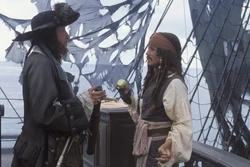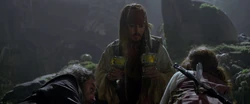
- "Trickster! Devil!"
- ―Blackbeard to Jack Sparrow
A trickster, according to mythology, folklore, and religion, was a character in a story (god, spirit, human or anthropomorphic creature) who exhibited a great degree of intellect or secret knowledge and used it to play tricks or otherwise disobey normal rules and defy conventional behavior. The trickster crossed and often broke both physical and societal rules. Many cultures had tales of the trickster, a crafty being who uses tricks to get food, steal precious possessions, or simply cause mischief.
History
- "What? You've seen it all, done it all. You survived. That's the trick, isn't it? To survive?"
"It's not just about living forever, Jackie. The trick is living with yourself forever." - ―Jack Sparrow and Teague
By the Age of Piracy, tricksters were archetypal characters that appear in the myths of many different cultures. The most notable trickster was Captain Jack Sparrow,[1][2][3][4] a legendary pirate of the Seven Seas and the irreverent trickster of the Caribbean.[5] Sparrow may have inherited his traits as a trickster from his enigmatic father,[4] Edward Teague.[6] When Sparrow asked Teague if the trick in having seen and done it all was, Teague's response was that living forever wasn't the trick, but "living with yourself forever."[3] Hector Barbossa, a rival pirate captain who matched with Jack Sparrow as an archenemy, was also considered a trickster, most notably when he was the cursed captain of the Black Pearl,[7] Although he would never admit it, Barbossa was secretly an admirer or Sparrow's incredible escapes and even attempted to study his old rival's methods.[8]

Jack Sparrow was full of tricks as an adventure-seeking teenage stowaway,[9] and even in his adulthood.[10][6][11] As a trickster, Jack was not particularly good at avoiding getting caught, but he knew that if he could bide his time, eventually the world would come over to his side, and that gave him a sort of supreme confidence that he could handle just about any situation. Although Sparrow was out to have his own good time, following his own self-interests, the things he did affected other people, in which it would sometimes be to good benefit and to their detriment.[12][13] During the quest for the Shadow Gold, when the Chinese pirate Sao Feng sent Jack Sparrow to find the Deep Sea Opal, Feng had Lian accompany Sparrow to ensure there were no tricks. In response, Sparrow pressed his hand to his chest like he was mortally offended, and then behind Feng's back, he blew Lian a kiss to Lian, who hid her face behind her hand, then peeked out at him with a flirtatious sparkle in her eyes.[11] When Jack Sparrow first encountered Will Turner, the pirate found it difficult to stay one step ahead of the young blacksmith and his tricks as pair dueled in the blacksmith's shop, though both Sparrow and Turner join forces in tricking Commodore James Norrington of the British Royal Navy by taking over the HMS Dauntless in order to commandeer the Interceptor.[1] During the search for the Dead Man's Chest, Jack tricked Will onto the scuttled ship to square his debt with Davy Jones, the cursed captain of the Flying Dutchman, though this resulted in Will being reunited with his father, Bootstrap Bill.[2] By the quest for the Fountain of Youth, Angelica knew Jack could be charming when he wanted something, though the trick was finding out what. Before his death at the Fountain of Youth, Blackbeard called Sparrow a trickster and "devil" after drinking from the Chalice that took his life.[4] Even when he was down on his luck, Captain Jack Sparrow resorted to all his tricks to survive when he was challenged by an enemy, namely the ghostly Armando Salazar.[10][14]
Behind the scenes
- "One of the archetypes that is really underused in American cinema is the trickster character. Most American movies tend to celebrate the warrior who does the right thing at the right time. But the fun thing about Jack, who is definitely a trickster, is that he's not particularly good at avoiding getting caught. He will get caught...you just can't hold on to him for very long. Jack knows that if he can just bide his time, eventually the world will come over to his side, and that gives him this sort of supreme confidence that he can handle just about any situation."
"The other fun thing about the trickster character is that he basically is just out to have his own good time. He's following his own self-interests. The things he does will affect other people—the mortals, if you will—and sometimes it will be to good benefit, and sometimes it will be to their detriment. So that goes back to the whole question posed in the first movie: is Jack Sparrow a good guy or is he a bad guy? Is he a pirate hero or pirate villain? Well, it really kind of depends on the perspective you have." - ―Terry Rossio and Ted Elliott
During the making of the 2003 film Pirates of the Caribbean: The Curse of the Black Pearl, there were conversations between director Gore Verbinski and writers Ted Elliott and Terry Rossio where they decided to make Jack Sparrow and Hector Barbossa two sides of the same trickster archetype.[7] Long John Silver from Robert Louis Stevenson's novel Treasure Island as well as the Clint Eastwood and Lee Van Cleef characters from the Western films by Sergio Leone were among the inspirations of the idea.[15][16] As stated by Elliott in The Curse of the Black Pearl audio commentary:
- This introduction of Barbossa actually matches the one of Jack. Jack is in the light, Barbossa's in the dark, but they're both standing above everything else. One of those odd things...that came out of conversations between Terry and Gore and I is Terry and I are big fans of Sergio Leone westerns. They take western conventions and add this air of mythology. Some of the characters in the Leone westerns are basically gods. They are more than just mere mortals. They get involved in mortals' lives, but mostly the issues of the gods belong to the gods. That idea is actually played out with Jack and Barbossa. They are the light and dark of the same trickster archetype. Again, here is basically Barbossa...The thing with the vocabulary and not understanding, you could see that being something Jack would do. The deal he makes, the loopholes he finds...They are paired in that way. One is the light side of this trickster and the other is the dark side of the trickster.[7]
While Barbossa's status as a trickster has not been stated regarding further installments, Jack Sparrow was continuously referred to as a trickster. Both writers Ted Elliott and Terry Rossio referred to Jack as a trickster;[12][15][16][17][18] The term was notably published in the 2007 book Bring Me That Horizon: The Making of Pirates of the Caribbean.[13] And while the word "trick" appeared in the trilogy,[1][2][3] among other related media,[9][6][11] "trickster" was first uttered in-universe by Blackbeard to Sparrow in the 2011 film Pirates of the Caribbean: On Stranger Tides.[4] Jack Sparrow was also described as the "irreverent trickster of the Caribbean" in his official character description for the film.[5]
Appearances
- Jack Sparrow: The Coming Storm
- The Price of Freedom
- Legends of the Brethren Court: The Caribbean
- Legends of the Brethren Court: Rising in the East
- Pirates of the Caribbean: The Curse of the Black Pearl (First appearance)
- Pirates of the Caribbean: Dead Man's Chest
- Pirates of the Caribbean: At World's End
- Pirates of the Caribbean: On Stranger Tides
Sources
- DisneyPirates.com
- Bring Me That Horizon: The Making of Pirates of the Caribbean (First identified as trickster)
External links
Notes and references
- ↑ 1.0 1.1 1.2 Pirates of the Caribbean: The Curse of the Black Pearl
- ↑ 2.0 2.1 2.2 Pirates of the Caribbean: Dead Man's Chest
- ↑ 3.0 3.1 3.2 Pirates of the Caribbean: At World's End
- ↑ 4.0 4.1 4.2 4.3 Pirates of the Caribbean: On Stranger Tides
- ↑ 5.0 5.1 'Pirates of the Caribbean: On Stranger Tides' New Stills Feature Queen Anne's Revenge, Character Descriptions - Archived
- ↑ 6.0 6.1 6.2 The Price of Freedom
- ↑ 7.0 7.1 7.2 The Curse of the Black Pearl Audio Commentary with Screenwriters Stuart Beattie, Ted Elliott & Terry Rossio and Jay Wolpert
- ↑ Pirates of the Caribbean: On Stranger Tides: The Visual Guide
- ↑ 9.0 9.1 Jack Sparrow: The Coming Storm, p. 46
- ↑ 10.0 10.1 Pirates of the Caribbean: Dead Men Tell No Tales
- ↑ 11.0 11.1 11.2 Legends of the Brethren Court: Rising in the East
- ↑ 12.0 12.1 POTC2 Presskit
- ↑ 13.0 13.1 Bring Me That Horizon: The Making of Pirates of the Caribbean, p. 46
- ↑ New materials for Disney blockbuster "Pirates of the Caribbean: Dead Men Tell No Tales" | Kino-Punk - (Новые материалы к блокбастеру Disney «Пираты Карибского моря: Мертвецы не рассказывают сказки» | Кино-Панк)
- ↑ 15.0 15.1 Close-Up: Ted Elliott & Terry Rossio on 'Dead Man's Chest' - Box Office Mojo - Archived
- ↑ 16.0 16.1 An Interview with Ted Elliott and Terry Rossio, writers of Pirates of the Caribbean - DVDizzy.com - Archived
- ↑ At Trilogy's End -- Writing the World of "Pirates" - Disney Insider: Main Attraction - Archived
- ↑ Terry Rossio Interview PIRATES OF THE CARIBBEAN 4: ON STRANGER TIDES | Collider - Archived